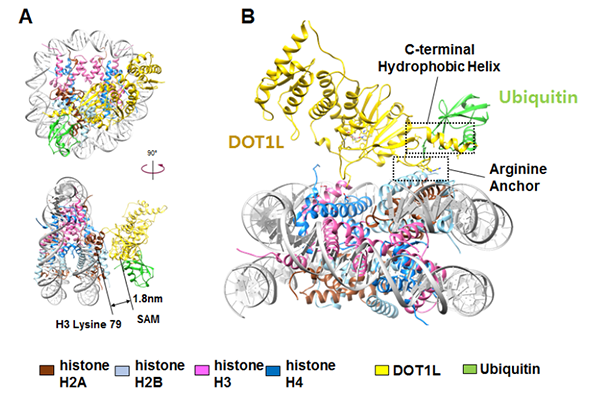As a project of KI for the BioCentury, Prof. Ji-Joon Song’s research team reported the mechanism of histone code recognition and destabilization of nucleosome by DOT1L, which is crucial factor of leukemia development. An MLL gene rearrangement in human DNA is known to form a massive MLL-AF4 fusion protein that induces over-recruiting of DOT1L protein on oncogenes. Over-activation of oncogenes by DOT1L seriously increases the probability of the development of leukemia. Due to bad prognosis and low survival rate, this “MLL-rearranged leukemia” is a high-risk case among blood cancers.
To elucidate the mechanism of recognition of ubiquitinated nucleosome by DOT1L, the research team adopted cryo electron microscopy (cryo-EM) and first discovered DOT1L’s destabilization effect on the nucleosome structure. According to this research, DOT1L use its basic double-arginine anchor to recognize the nucleosome acidic patch. Furthermore, DOT1L initiates hydrophobic interaction with ubiquitin on the nucleosome with its C-terminal hydrophobic patch. Fortunately, and unexpectedly, the team observed non-catalytic effects of DOT1L, which destabilizes the nucleosome structure. Binding of DOT1L enhanced by ubiquitin on nucleosomal histone induces detachment of DNA from the histone octamer and disorders the histone H3 and H2B secondary structure, known for anchoring DNA on the nucleosome. This research was published in Genes and Development on March 29th, 2019.

Prof. Ji-Joon Song, Mr. Seongmin Jang Dept. of Biological Sciences, KAIST
Homepage: http://www.song-kaist.org
E-mail: songj@kaist.ac.kr, w920831@kaist.ac.kr






